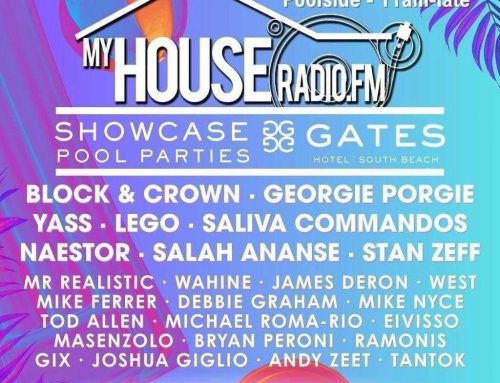
- KRIS LORI
- Jerome Derradji of Still Music inspects a multitrack tape from Record Al’s house-music cache in his Humboldt Park home. For the photo shoot, he made the obviously unpremeditated choice to wear a T-shirt for another one of his labels.
Last summer, Chicago DJ and producer Jerome Derradji returned to his native France for the first time in a decade. He needed to clear his head after a legal battle with a New York distribution company nearly sank Still Music, the dance label he’d founded in 2004. After spending a few weeks abroad, he felt better personally, but his business was in the same sad state he’d left it in. It was a lousy time for him to get a phone call from an unfamiliar record dealer offering him a very expensive once-in-a-lifetime opportunity.
From the point he’d signed with the distributor, Derradji’s ordeal had lasted for two and a half years. “They promised us a really great pressing and distribution deal, and they completely messed it up—a year later, we had four records out and none of the re-presses that we needed to do,” he says. “I sued them, and that cost me a ton of money. I had to get my rights back and my catalog back.”
Through arbitration Derradji regained the rights to Still Music’s catalog, but a huge amount of damage had already been done. “Almost two years of the label completely gone because of those guys, more than a third of my stock lost that I’ll never find again, that I couldn’t forward to artists or anything,” he laments. “Almost 13 years of work down the garbage.”
When the stranger called with his offer last August, Derradji had to face the grim situation his label was in before he could even think about answering. The dealer asked if he wanted to buy a batch of reel-to-reel tapes—mostly 1980s radio mixes by house-music DJs. That description didn’t sell Derradji on the collection. “I remember very well telling him, ‘I’m not really interested in radio mixes. I don’t know what I’d do with it—I’m a record label,'” he says.
In response the dealer, who goes by Record Al (his real name is Brehon Charles Allen), sent a photo of the tapes. Derradji noticed that some of the reels were in wide boxes, which seemed to indicate multitrack recordings. Radio mixes aren’t typically recorded that way—plus Derradji knew he’d be better able to rework and restore music on multitrack tapes, not least because the recordings were likely to be of higher quality. The following day, he met Al at a south-side storage facility. “He opens his storage locker, and it was full of tapes, literally right in front—it’s incredible,” he says.

- KRIS LORI
- In the collection Derradji bought, smaller tapes like this are likely to be radio mixes.
Derradji organized the boxes into different piles: radio mixes, multitrack tapes, and label masters (which were also multitrack tapes). “I had, at this point, no intention of buying it,” he says. Between hearing from Record Al and visiting the storage facility, he’d learned a little more about the collection from Kevin Starke, a fellow DJ and producer (and owner of the late KStarke Records). Al had first contacted Starke, who’d referred him to Derradji. “I thought the guy wanted $10,000 for it—that’s the number I heard that he’d been asking around for a while,” Derradji says. “It looks like he’s been trying to sell that stuff for ten years. I heard famous companies in Europe were approached but didn’t really realize what it was.”
>> Read More https://m.chicagoreader.com/chicago/jerome-derradji-still-house-tapes-reels-knuckles-crosby/Content?oid=51992581




